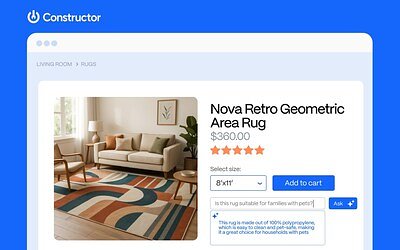
AI-Powered Shopping Assistants Aim to Bridge Ecommerce ‘Confidence Gap’
Constructor's new AI product insights tool promises to answer shopper questions and boost conversions, but how does it stack up against rivals in a rapidly evolving retail landscape?
AI-Powered Shopping Assistants Aim to Bridge Ecommerce ‘Confidence Gap’
San Francisco, CA – November 6, 2024 – As online shopping continues to dominate retail, a critical challenge persists: building trust and overcoming hesitation among customers. Constructor, a leading provider of AI-powered product discovery solutions, believes it has a solution. The company recently launched its AI Product Insights Agent (PIA), designed to answer shopper questions, provide personalized recommendations, and ultimately, bridge the “confidence gap” that often prevents online purchases.
PIA leverages generative AI to provide detailed product information, answer customer queries, and guide shoppers towards informed decisions. But in a crowded market filled with AI-driven retail tools, how does Constructor’s offering stand out, and what impact could it have on the future of online shopping?
Addressing the Ecommerce ‘Confidence Gap’
For many consumers, the lack of tactile experience and immediate feedback in online shopping remains a barrier. Unlike brick-and-mortar stores, where customers can physically examine products and seek assistance from sales associates, online shoppers rely on static images, descriptions, and user reviews. This information asymmetry can lead to uncertainty and hesitation, ultimately impacting conversion rates.
“One of the biggest challenges for online retailers is replicating the personalized experience of a physical store,” said a retail industry analyst. “Customers crave information and reassurance before making a purchase, and AI-powered assistants like PIA aim to provide that.”
Constructor argues that PIA addresses this challenge by providing a dynamic and interactive shopping experience. The tool can answer complex product questions, compare features, and offer personalized recommendations based on individual shopper preferences. This level of assistance can help build trust and confidence, encouraging customers to complete their purchases.
How PIA Works: Generative AI at Play
At the heart of PIA lies generative AI – the same technology powering popular chatbots like ChatGPT. This allows the tool to go beyond simple keyword matching and provide nuanced, contextually relevant responses.
“Traditional AI often relies on pre-programmed responses,” explained a technology consultant specializing in AI retail solutions. “Generative AI, however, can understand natural language and generate original text, enabling a more human-like conversation with shoppers.”
Constructor claims that PIA can handle a wide range of product inquiries, from basic feature comparisons to complex technical questions. The tool is designed to integrate seamlessly with existing ecommerce platforms, providing a consistent and personalized shopping experience across all channels.
Standing Out in a Crowded Market
Constructor is not alone in its pursuit of AI-powered retail solutions. Several other companies are vying for dominance in this rapidly evolving market, including Dynamic Yield (now part of Mastercard), Bloomreach, and Salsify.
“The market for AI-powered retail tools is becoming increasingly competitive,” said a venture capitalist specializing in retail tech investments. “Companies are constantly innovating and adding new features to differentiate themselves.”
Several key differentiators set Constructor apart. Firstly, its focus on generative AI allows for more natural and engaging customer interactions. Secondly, the company’s commitment to measurable results, with a focus on revenue and conversion rate improvements, appeals to data-driven retailers. Lastly, Constructor’s existing suite of AI-powered solutions, including its Shopping Agent and recommendation engine, provides a comprehensive approach to AI-powered ecommerce.
However, challenges remain. Ensuring the accuracy and reliability of AI-generated responses is crucial. “AI models can sometimes produce inaccurate or misleading information,” noted the technology consultant. “Retailers need to carefully monitor and validate the responses generated by these tools.”
Funding and Future Outlook
Constructor has secured over $50 million in funding from investors including Sequoia Capital and Accel, signaling confidence in the company’s vision. The company boasts a client list of over 50 enterprise retailers, indicating strong market traction.
While independent verification of specific claims regarding revenue increases associated with PIA is currently limited, several industry analysts believe that the tool has the potential to significantly impact online retail.
“AI-powered shopping assistants are still in their early stages of development,” said the retail industry analyst. “But as the technology matures, it’s likely to become an essential part of the online shopping experience.”
The company is currently focused on expanding the capabilities of PIA, including adding support for more languages and product categories. Constructor also plans to integrate the tool with other retail technologies, such as virtual reality and augmented reality, to create even more immersive and engaging shopping experiences.
As online shopping continues to evolve, AI-powered tools like Constructor’s PIA will play an increasingly important role in bridging the confidence gap and driving sales. While challenges remain, the potential benefits are significant, promising a future where online shopping is as seamless, personalized, and trustworthy as a visit to your favorite brick-and-mortar store.
